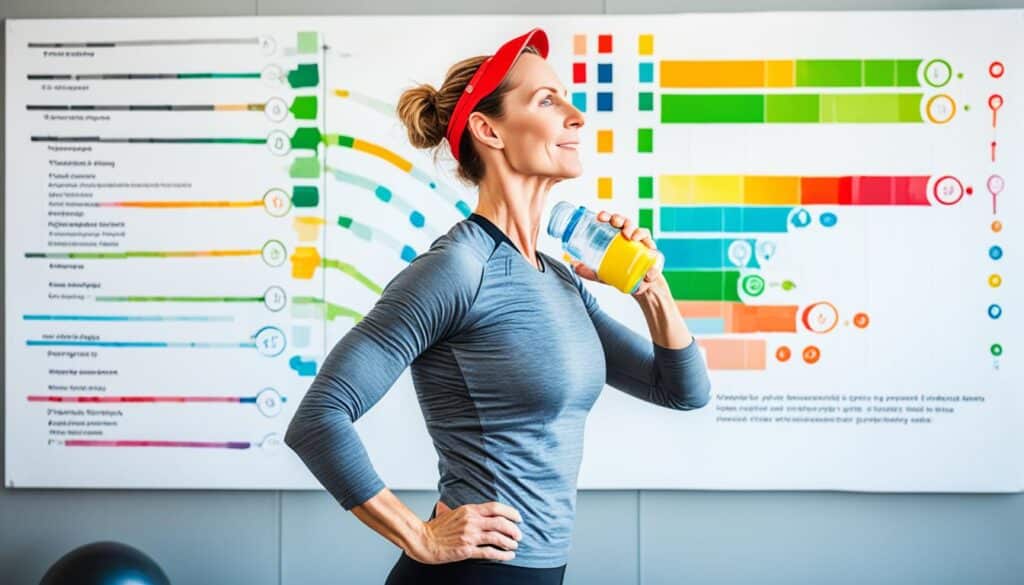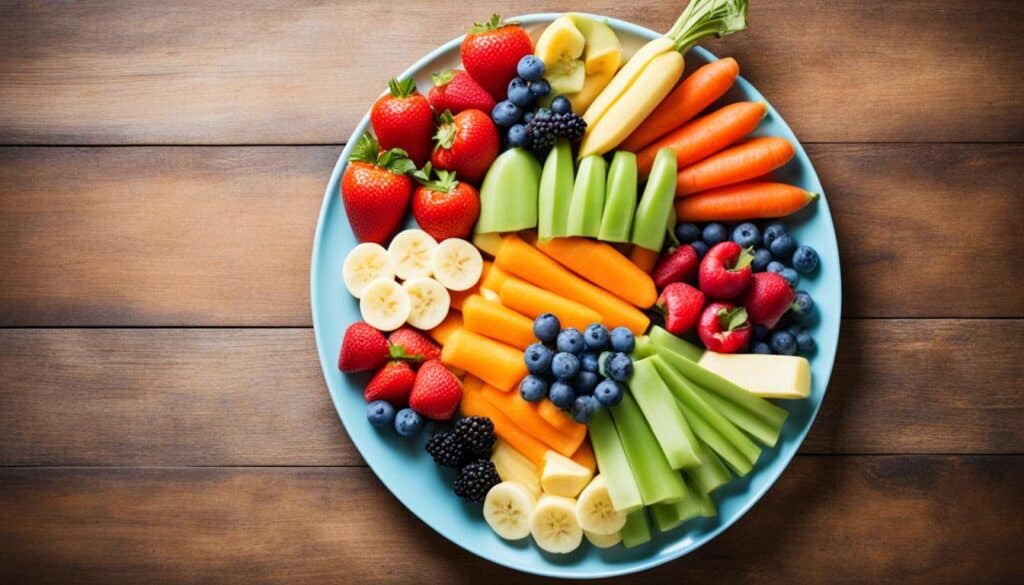In today’s world, social media and information overload are huge. A whopping 1.2 million tweets over 16 months were filled with nutrition advice from non-experts. With only one out of nine popular weight loss influencers in the U.K. being trustworthy, it’s key to be careful about who you listen to for health tips.
Some nutrition advice might sound good and even scientific. But it’s vital to know the difference between facts and fiction. Registered dietitians (RDs) have the right education and experience. They can give you trustworthy advice and help you avoid misleading info.
Bad nutrition advice can lead to serious health issues, like detox teas causing harm or crash diets causing eating disorders. To stay healthy, get advice from qualified healthcare pros and know the common myths. This way, you can make smart choices for your health and get lasting results.
Key Takeaways
- Be cautious of nutrition advice from non-health professionals on social media
- Only a small fraction of popular weight loss influencers provide trustworthy guidance
- Registered dietitians (RDs) are qualified to offer reliable nutrition advice
- Following bad nutrition advice can have severe consequences for your health
- Seek guidance from healthcare professionals to make informed decisions for your wellbeing
Table of Contents
The Danger of Following Unsound Nutrition Advice
In today’s world, it’s important to be careful with the diet advice you take. Many diets push for extreme steps, like cutting out whole food groups, which can lead to quick but not lasting weight loss. These strict diets can also make people have a bad mindset about food and may even cause eating disorders.
Yo-yo dieting, which often comes from bad diet advice, has many health risks. Losing and gaining weight back can cause nutrient shortages, muscle loss, and harm your bones and fertility. It can also make you unhappy with your body and lead to eating disorders.
“The most effective approach to achieving and maintaining a healthy weight is through balanced eating and regular physical activity. Fad diets may promise quick results, but they rarely deliver lasting success.”
Don’t be tempted by quick-fix diets. Go for a balanced eating plan and aim to lose 1-2 pounds a week, which is healthy and sustainable. Slowly changing your lifestyle and eating a variety of whole foods helps you keep the weight off and improves your health for the long run.
| Fad Diet Risks | Balanced Eating Benefits |
|---|---|
| Nutrient deficiencies | Adequate intake of essential nutrients |
| Muscle loss | Preservation of lean muscle mass |
| Electrolyte imbalances | Stable electrolyte levels |
| Impaired bone health | Strong, healthy bones |
| Increased risk of eating disorders | Positive relationship with food |
Remember, a healthy life is about balance, not extremes. By avoiding bad diet advice and choosing a balanced eating plan, you can have a good relationship with food. This supports your health and brings lasting benefits.
Debunking the Myth of “No Bad Foods”
You might have heard that “there are no bad foods, only bad diets.” This idea tries to encourage balanced eating. But, it’s not entirely true. Some foods have much less nutritional value than others. Eating too much of these can harm your health.
The Fallacy of Equating All Foods
Not all foods are the same. For example, eating a serving of fresh broccoli is much better than eating potato chips or candy bars. Both give calories, but broccoli is packed with nutrients.
| Nutrient-Dense Foods | Junk Foods |
|---|---|
| High in vitamins and minerals | Low in essential nutrients |
| Contain fiber and healthy fats | High in unhealthy fats and added sugars |
| Support overall health and well-being | Can contribute to weight gain and chronic diseases |
Ultra-processed foods, which are common in Western diets, are linked to weight gain, binge eating, and other health problems. Foods with lots of refined sugars and oils can upset your body’s balance.
Accepting the Reality of Unhealthy Foods
All foods can be part of a balanced diet, but some are clearly less healthy. Junk foods are often high in calories but low in nutrients. It’s okay to eat them, but do so in moderation.
“The importance of debunking myths, eliminating trends, and adopting a mindset of ‘no bad foods’ is highlighted by Fernandez.”
Nutrition expert Fernandez says it’s important to teach people how to make smart food choices. Knowing the nutritional value of foods helps you make better diet decisions.
For a healthy diet, balance and moderation are key. It’s fine to enjoy less healthy foods sometimes. But, your diet should mainly include whole, nutrient-rich foods for your health and well-being.
Unrefined Sugar: Not a Healthier Alternative
You might think that unrefined sugars like honey, agave nectar, maple syrup, and coconut sugar are better than regular sugar. But remember, sugar is sugar, no matter the type. These sweeteners might have some nutrients, but they still add to your daily sugar intake. So, it’s important to eat them in small amounts.
The American Heart Association (AHA) says women should not have more than 6 teaspoons (25g) of added sugars a day. Men should limit it to 9 teaspoons (36g). Too much sugar can lead to obesity and heart disease. So, watch how much sugar you get from all sources, including these sweeteners.
There are over 60 names for sugar on food labels, making it hard to spot added sugars. Foods like donuts, bread, candy, soda, fruit punch, sweet tea, ketchup, and barbeque sauce often have added sugar. Eating too much sugar from these can cause health problems like high blood sugar, insulin resistance, and obesity.
“Sugar is sugar, regardless of its form. While unrefined sweeteners may contain trace amounts of nutrients, they still contribute to your daily sugar limit and should be consumed in moderation.”
Instead of using unrefined sweeteners, eat whole foods that are naturally sweet. These foods give you important vitamins, minerals, and antioxidants. The Dietary Guidelines for Americans suggest eating 2 cups of fruit and 2.5 cups of vegetables every day for a balanced diet.
| Sweetener | Potential Health Risks |
|---|---|
| Saccharin | May reduce good gut bacteria, potentially leading to obesity, inflammatory bowel disease (IBD), and colorectal cancer |
| Aspartame | May not reduce calorie intake or body weight compared to sugar, and linked to lower levels of HDL (good) cholesterol |
| Sucralose | May decrease beneficial gut bacteria, increase inflammation, and lead to weight gain |
| Acesulfame K | May impair mental function and memory, and lead to weight gain and negative gut bacteria alterations |
| Xylitol | May cause digestive issues such as stomach pain, gas, diarrhea, and constipation in people with irritable bowel syndrome (IBS) |
| Agave nectar | Regular fructose intake associated with a higher risk of fatty liver disease, insulin resistance, high LDL (bad) cholesterol, and triglyceride levels |
| Sorbitol | Acts as a laxative, potentially causing digestive issues like bloating, gas, stomach pain, cramps, and diarrhea |
It’s important to cut down on added sugars and refined foods, but don’t cut out all sugar. Doing so could mean missing out on important nutrients from fruits, grains, and dairy. Dietitians say to keep a balance of carbohydrates and sugars by eating whole, minimally processed foods. This helps support your health and well-being.
The Misconception About Fruit and Sugar Content
Many people think fruit is bad because of its sugar. But, this belief overlooks the key role of natural sugars in our diet. Fruits are packed with nutrients that are good for us.
The Brain’s Need for Natural Sugars
Your brain needs glucose, a type of sugar, to work well. This sugar keeps your mind clear, focused, and energized. It also helps your muscles during exercise.
Fruits have sugar, but it’s different from the sugar in processed foods. Too much added sugar is bad, but fruit sugar comes with lots of good stuff.
Fruit’s Nutritional Benefits Outweigh Sugar Concerns
Fruits are full of vitamins, minerals, and antioxidants that are good for you. For example:
- Potassium in bananas and melons helps keep your blood pressure in check and supports your heart.
- Oranges and grapefruits are full of vitamin C, which boosts your immune system and keeps your skin healthy.
- Berries like strawberries and blueberries are packed with antioxidants that fight stress and inflammation in your body.
Fruits also have soluble and insoluble fiber. This fiber is great for your digestive health, helps with bowel movements, and supports good gut bacteria.
| Food | Carbohydrate Content (per portion) |
|---|---|
| Fruit | 15-20g |
| Slice of bread | 15-20g |
| Can of cola | 35g |
| Medium slice of chocolate cake | 35g |
Look at the table above. A fruit portion has as much carbs as a slice of bread. But, cola and chocolate cake have way more sugar. This shows why choosing fruits over processed sugars is better.
Eating fruits and vegetables lowers the risk of health problems like high blood pressure, heart diseases, strokes, obesity, and some cancers.
Adding different fruits to your diet lets you enjoy their sweetness and get many health benefits. Fruits are key to a balanced, healthy diet, despite their sugar content.
Juicing for Weight Loss: A Misguided Approach
Many people try juice cleanses to lose weight fast, thinking that fruit and vegetable juices will help. But, this method is not good for your health in the long run. Juicing can add more fruits and veggies to your diet, but it’s not the best way to lose weight.
Inadequate Calories and Nutrients
Starting a juice cleanse means you eat very few calories. While losing weight needs a calorie deficit, eating too few calories can make you very hungry, tired, and lacking in nutrients. Your body needs enough calories to work right and keep your metabolism healthy.
A study by Imamura et al., 2015, showed that too much fruit juice can increase the risk of Type 2 diabetes. The study found that more fruit juice each day raised the risk by 18%.
Lack of Protein and Healthy Fats
Juicing removes the fiber from fruits and veggies, which is key for feeling full and staying healthy. Juice cleanses also don’t have enough protein and healthy fats. These are important for feeling full and satisfied. Without them, you might always feel hungry and have trouble reaching your weight loss goals.
Better Alternatives for Sustainable Weight Loss
Don’t rely on juice cleanses. Instead, eat a balanced diet with lots of fruits, veggies, lean proteins, whole grains, and healthy fats. This way, you get the nutrients you need and support lasting weight loss.
If you like the taste of fresh juices, add them to your diet as a supplement. Remember, the best way to lose weight is by eating well and staying active.
“Juice cleanses may seem like a quick fix for weight loss, but they are not a sustainable or healthy approach. Focus on nourishing your body with a balanced diet that includes a variety of whole foods to achieve lasting results.” – Dr. Sarah Johnson, Registered Dietitian
Navigating Beyond the Perimeter: Finding Nutritious Options in Every Aisle
Shopping only the perimeter of the store for nutrition might limit your choices and strain your budget. The perimeter has fresh produce, meat, poultry, and dairy. But, the center aisles are full of nutritious and affordable foods like whole grains, plant-based proteins, and healthy fats.

Elaine Magee, a registered dietitian, says there are better nutrition options in every aisle. She suggests choosing high-fiber cereals and whole-grain breads from the center aisles for healthier eating.
For plant-based proteins, look in the canned and dried goods sections. Beans, lentils, and nuts are nutritious, affordable, versatile, and easy to store. They help you make satisfying meals without spending a lot.
“There are no good or bad foods,” mentioned a spokesperson of the Grocery Manufacturers of America, highlighting the importance of a balanced approach to nutrition.
It’s important to read labels and ingredient lists to make good choices. Look for whole grains as the first ingredient and watch out for added sugars and unhealthy fats. Magee advises that if sugars or unhealthy fats are in the first three ingredients, the product is likely not a good choice.
Here are some tips to help you shop better:
- Make a list before shopping to save time and reduce impulse purchases
- Shop on a full stomach to avoid temptation
- Compare prices and opt for whole foods when possible
- Read nutrition labels to track your intake and make healthier choices
| Aisle | Nutritious Options |
|---|---|
| Canned Goods | Beans, tomatoes, fish |
| Grains | Whole-grain bread, brown rice, quinoa |
| Nuts and Seeds | Almonds, chia seeds, flax seeds |
| Frozen Foods | Frozen fruits and vegetables, whole-grain waffles |
By shopping the whole grocery store and focusing on whole grains, plant-based proteins, and affordable nutrition, you can eat well without sacrificing taste or convenience. Don’t overlook the nutritional gems in the center aisles – your body and wallet will thank you!
The Whole Egg: Embracing the Nutritional Power of Yolks
When it comes to healthy eating, you might think skipping egg yolks is best. But, these golden centers are packed with nutrients. They are full of vitamins, minerals, and healthy fats that are good for you.
Egg yolks are a great source of choline, which is good for your brain and muscles. They also have vitamins A, D, E, and K, and B vitamins like B12. These nutrients help with energy and overall health.
Many think the cholesterol in egg yolks is bad, but it’s not a big deal for most people. Eating one egg a day won’t raise your heart disease risk. In fact, your body doesn’t absorb much of the cholesterol from eggs, so it doesn’t affect your cholesterol levels much.
| Nutrient | Amount per Large Egg Yolk |
|---|---|
| Protein | 2.7 grams |
| Choline | 115 mg |
| Vitamin A | 75.5 mcg |
| Vitamin D | 0.88 mcg |
| Vitamin E | 0.44 mg |
| Vitamin B12 | 0.33 mcg |
Egg yolks also have essential fatty acids, like omega-3s, which are good for your heart and brain. These fats make you feel full and satisfied. Plus, they have antioxidants like lutein and zeaxanthin, which help your eyes stay healthy.
Eggs are among the most nutritious foods on the planet. A whole egg contains all the nutrients required to turn a single cell into a baby chicken.
So, don’t be afraid of the yolk when you crack open an egg. Enjoy the whole egg for its nutritional benefits. Adding whole eggs to your diet gives you a lot of important nutrients for your health and well-being.
Personalized Hydration: Moving Past the “8 Glasses a Day” Rule
You’ve likely heard the advice to drink eight glasses of water a day for optimal hydration. But this rule doesn’t fit everyone the same way. Everyone’s body has different needs for fluids, based on many factors.

Factors Influencing Individual Fluid Needs
The U.S. National Academies of Sciences, Engineering, and Medicine suggest about 15.5 cups (3.7 liters) of fluids daily for men. Women should aim for about 11.5 cups (2.7 liters). These numbers can change due to:
- Age and body size
- Gender
- Activity level and exercise intensity
- Environmental conditions (heat, humidity)
- Overall health status
- Pregnancy and breastfeeding
About 20% of our daily fluids come from food, not just drinks. Eating foods like fruits and vegetables helps with hydration too.
Monitoring Urine Output and Color for Hydration Status
Instead of following a strict “8 glasses a day” rule, watch your urine. It should be pale yellow and you shouldn’t feel thirsty often. You should pee every 2-4 hours.
- Consistent pale yellow urine color
- Absence of frequent thirst
- Regular urination (every 2-4 hours)
If your urine is dark yellow or you have headaches, you might be dehydrated. If you’re not sure about your hydration, talk to a healthcare expert or a dietitian for advice.
| Urine Color | Hydration Status |
|---|---|
| Pale yellow or clear | Well-hydrated |
| Dark yellow | Mildly dehydrated |
| Amber or honey-colored | Moderately dehydrated |
| Brown or dark orange | Severely dehydrated |
Stay hydrated by drinking water with meals, between meals, before, during, and after exercise. Drink when you feel thirsty. Your body’s hydration needs are unique, so pay attention to it and adjust your habits as needed.
Conclusion
Finding good nutrition advice can be hard, with lots of conflicting info and a lot of money spent on bad advice. It’s important to be careful and look for advice from experts. Stay away from extreme diets and foods that are always bad.
Instead, aim for healthy eating habits that include many different foods. This way, you can stay healthy and feel good. A balanced diet is the best way to go.
Don’t think of foods as just “good” or “bad.” Some processed foods are really important for people who don’t have much food. Foods like oatmeal, quinoa, and sweet potatoes give you energy and help with fitness goals.
Finding the right nutrition plan is key to long-term health and happiness. Focus on whole foods, make sure you get enough protein, carbs, and fats. And don’t be afraid to change your diet if you need to.
Registered dietitians and nutritionists can give you advice that really fits your needs. With their help, you can eat well and reach your health goals. Trust in their knowledge and take care of your body. This way, you can enjoy a healthy life.
FAQ
How can I spot bad nutrition advice?
Watch out for extreme diets and claims that blame certain foods. Trust advice from registered dietitians (RDs). They have the right knowledge to guide you well.
What are the dangers of following unsound nutrition advice?
Bad advice can lead to harmful eating habits and even eating disorders. It can hurt your mental and physical health. Aim for a balanced diet for a healthy life.
Is it true that there are no bad foods?
Not all foods are equal in nutrition. Some are less healthy than others. It’s okay to limit unhealthy foods, but don’t cut them out completely. Remember, moderation is key.
Are unrefined sugars like honey and maple syrup healthier than ordinary sugar?
Sugar is sugar, no matter the type. Unrefined sugars may have some nutrients, but they still add to your daily sugar intake. Try to get your nutrients from whole foods instead.
Should I avoid fruit because of its sugar content?
No, fruit sugar is different from added sugars in foods. Fruit is full of vitamins, minerals, and nutrients like potassium and antioxidants. The benefits of eating fruit outweigh its sugar content.
Is juicing a good way to lose weight?
Juicing for weight loss is not a good idea. It’s not a lasting way to manage weight. Instead, eat a balanced diet with fruits, veggies, lean proteins, whole grains, and healthy fats.
Should I only shop the perimeter of the grocery store for healthy foods?
The perimeter has fresh foods, but the center aisles have great foods too. Look for beans, whole grains, and nuts. These foods are nutritious, affordable, versatile, and easy to store.
Are egg yolks unhealthy and should I avoid them?
Don’t skip the yolks; they’re full of nutrients. Egg yolks have vitamins A and D, fatty acids, and antioxidants. Eating the whole egg gives you the most nutrition, so keep the yolks in.
How much water should I drink per day?
The “8 glasses a day” rule isn’t right for everyone. Check your urine output and color to see if you’re drinking enough fluid. If your urine is pale yellow, you’re hydrated. Dark urine means you need more water.
Source Links
- Bad nutrition advice dietitians are begging you to forget
- How to Tell Real Nutrition Advice from Fad Diets
- Nutrition Misinformation: How to Identify Fraud and Misleading Claims – 9.350 – Extension
- The Health Risks of Fad Diets – Oklahoma State University
- 8 Myths About Healthy Eating You Need To Stop Believing
- Dismantling the myth of “all foods fit” in eating disorder treatment – Journal of Eating Disorders
- Rooted in wellness
- Supersized Lies: How Myths About Weight Loss Are Keepin…
- 8 ‘Healthy’ Sugars and Sweeteners That May Be Harmful
- Which Sugars Are Good for You — and Which Ones to Avoid
- Facts About Sugar and Sugar Substitutes
- 10 Nutrition Myths Experts Wish Would Die (Published 2023)
- Myth: I can’t eat fruit if I have diabetes
- Fruit Juices: Are They Helpful or Harmful? An Evidence Review
- The Top 20 Biggest Nutrition Myths
- Navigating the grocery minefields
- Tips For Healthy Grocery Shopping | Vision Personal Training
- Are eggs good for you or not?
- The Golden Egg: Nutritional Value, Bioactivities, and Emerging Benefits for Human Health
- How much water do you need to stay healthy?
- The Water Myth
- It’s not 8 glasses a day anymore. Here’s how much water you should drink each day
- Finding the Truth I: Reliable Nutrition and Health Information
- My thoughts on that anti-dietitian Washington Post article | Nutrition By Carrie
- Are You Getting Bad Nutrition Advice?

Hey, I am Dr. Jenna Calloway. What you put into your body is what, intrinsically, makes the difference between success and burnout. Healthy food is fuel, and after years of working with high-performing professionals, I’ve put together nutrition strategies that are not only healthy but delicious and realistically easy to fit into your busy life. Whether you’re powering through a hectic day or looking to elevate your workouts, let me guide you on the path toward feeling your absolute best!

